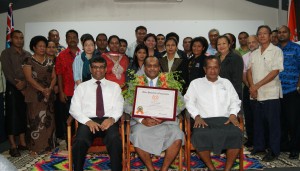
Fiji Alumni of the Asian Productivity Organization at the Alumni on 30 March 2012. Photo courtesy of NTPC.
The inaugural APO Alumni Fiji meeting was held at the National Training and Productivity Centre (NTPC) headquarters on the campus of Fiji National University in Suva on 30 March 2012. Over 100 APO project alumni in attendance welcomed presentations from Ranju Kumar on the development of productivity specialists, Ravinesh Krishna on Green Productivity, Viliame Waqalaivi on best practices in business excellence, and Ratu Meli Nacuva on lean manufacturing. The APO Alumni Fiji Steering Committee was also elected to provide directions and develop the formal structures and strategies for the Alumni.
Adding significance to the event, APO Alternate Director for Fiji and NTPC Director Kamlesh Prakash conferred the APO Honorary Fellow Award on Minister for Labor, Industrial Relations and Employment Jone Usamate in recognition of long service in promoting productivity in APO member countries. Reflecting on his more than 20 years in promoting and raising productivity in Fiji through his involvement with the Training and Productivity Authority of Fiji (rebranded as the NTPC), Minister Usamate said, “Promoting productivity and raising productivity requires champions, people who will go out of their way to not only talk about ways of improving productivity, but will actually start and complete productivity improvement projects, people who will spread information about productivity and help others to improve their own productivity. Such alumni will become the beginning of a network that speaks and breathes productivity.” He asserted that future productivity growth on two levels could help cushion the impacts of global economic crises, which the world and especially smaller nations like Fiji had been rocked by over the past several years: the sociocultural values that influence attitudes toward productive work; and macro-economic policies that create an enabling environment for economic actors and enterprises to be productive and competitive.
NTPC Director Prakash noted that over 1,000 persons in Fiji had attended APO projects and the country already had the critical mass that could help effect needed changes in industry. “Fijians in industry, agriculture, government, academia, and NGOs, have gained tremendously from those attending the APO projects, and many organizations have profited from the learning and exposure they acquired.” Director Prakash added that while “A loose coalition of productivity champions is admirable, more formal structures need to be in place to develop systematic plans and actions to advance the national productivity agenda.” APO Alumni Fiji will assist the NTPC in promoting productivity nationally and augment training resources.

